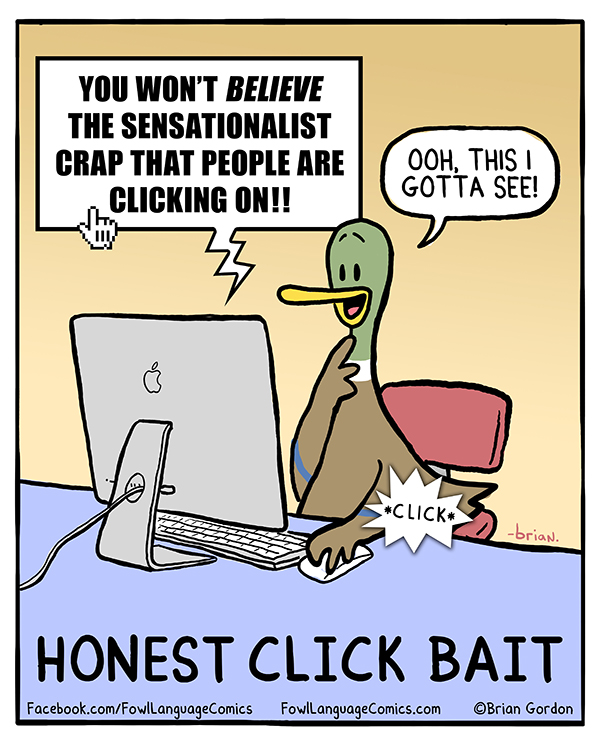Click-Bait is the term used for those annoying headlines that promise something amazing, but lack any substance when you follow the link.
Examples include:
- You will never look at ice-cream the same way again when you see this!
- He called the police – but it was the next call that really turned things around!
- He changed his name for a horrible reason, and now he is telling us why!
- She made a sex tape but she never expected this!
(You will notice, there is always an exclamation mark at the end)
However, as anyone who has ever used the internet can verify, these sorts of headlines are almost always misleading and lack any real substance. In short, they do not provide the information they promise and, from a marketing viewpoint (well, any view point), breaking promises is bad.
Audacious titles and headlines give a false impression to people and sensationalise blogs and articles. When that happens people who click on the links will be disappointed with the content and less likely to return to your website.
So why do people do it?
Why add click-bait to your site?
Click-baiting is used to bring a constant flow of traffic to a web site, but the reality is that it is often traffic that may not even be useful in the long-term.
Click-baiting is one of the bad side effects of an old fashioned approach to SEO (search engine optimisation) and site content marketing.
It originally started as a practice to hook readers and get them to click on your link from a social media site and visit your page.
The tactic was most prevalent among sites that rely of advertising placement for their income, such as UpWorthy, BuzzFeed and Distractify.
The idea was to show their own advertisers impressive traffic statistics.
Click-bait headlines aren’t clever and new any more, and for most people they are just annoying: just another form of spam cluttering up their lives.
Today, with some social media platforms like Facebook actually penalising it and Google reported to be looking at ways to drop sites that use it excessively, it is not even so much that click-bait might spoil your online reputation – it might even soon get your site blacklisted!
As with all bad practices, clients of self-styled “social media gurus” and “SEO experts” soon begin to realise that the traffic click-baiting is driving is not of any value to their business, but often they have invested thousands of dollars in these dodgy practices before the realisation dawns.
The cruel fact is that people who are attracted by catchy headlines are invariably not the customers that you are looking for anyway.
In summary, this is why you should avoid click-baiting:
1. Click-bait makes you look less authoritative
Click-bait tactics are not used by respectable companies or newsrooms. We do not see Apple or Microsoft using click-bait techniques. Nor do we see the ABC, the New York Times or the Guardian using catchy titles to attract traffic. Their quality of content attracts their traffic – and that is how it should be.
When you use tactics like click-baiting, you look like a desperate novice who is trying hard to grab attention and it backfires.
2. Click-bait attracts the wrong kind of traffic
Those who are attracted to catchy titles expect something sensational. Unless you are releasing a genuinely astounding innovation you should not indulge in sensational advertising because you are about to break a promise the moment your reader clicks. When they see your article lacks the substance you promised they leave your website disappointed.
Those who are NOT attracted to catchy titles are put off your business and look at you with disdain.
So, in the end, you get nothing at all.
3. Click-baiting is a fad that has passed its prime.
Click-baiting depends on terms and trends that reflect fad in our societies. They are attractive and are catchy only for a certain demographic and for a certain period of time. When the trend shifts, your content becomes irrelevant and no-one will bother to go back and read it again.
You cannot possibly create timeless content when you all you rely upon are catchy and trendy titles.
Timeless solutions depend on the quality of the content and the seriousness of what is being published.
If your article depended on titles to attract people, you probably are writing the wrong way.
Focus on your content so that it speaks for itself.
If you cannot write well, hire content writers who are efficient and talented. They should be able to write well without resorting to tactics such as keywords or click-baits, ensuring there is a certain level of quality to what you publish.
Aim to be respected as as business that is of high quality and be sure your writing reflects that aim.

